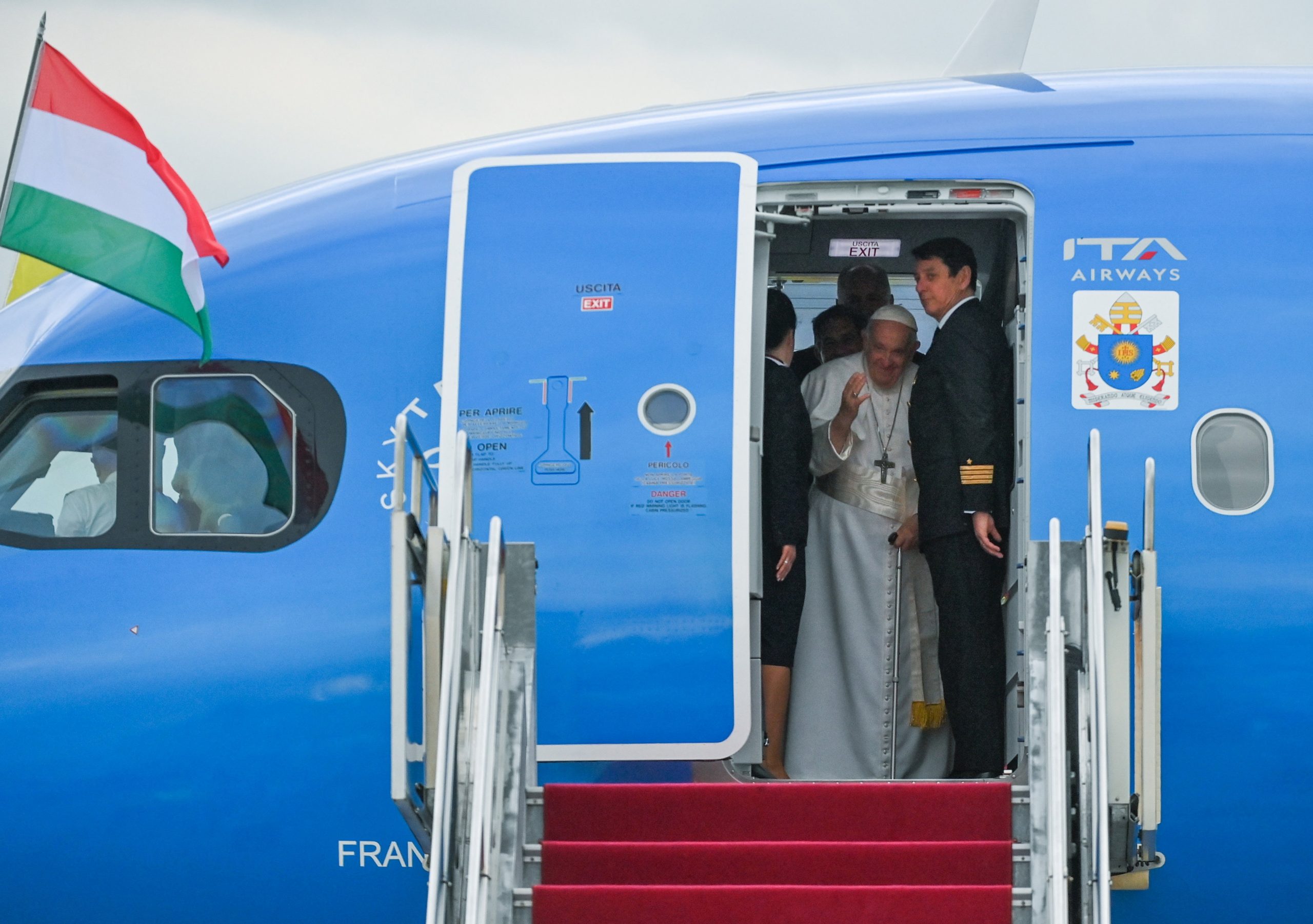
The head of the Catholic Church left Hungary shortly after 6pm.Continue reading
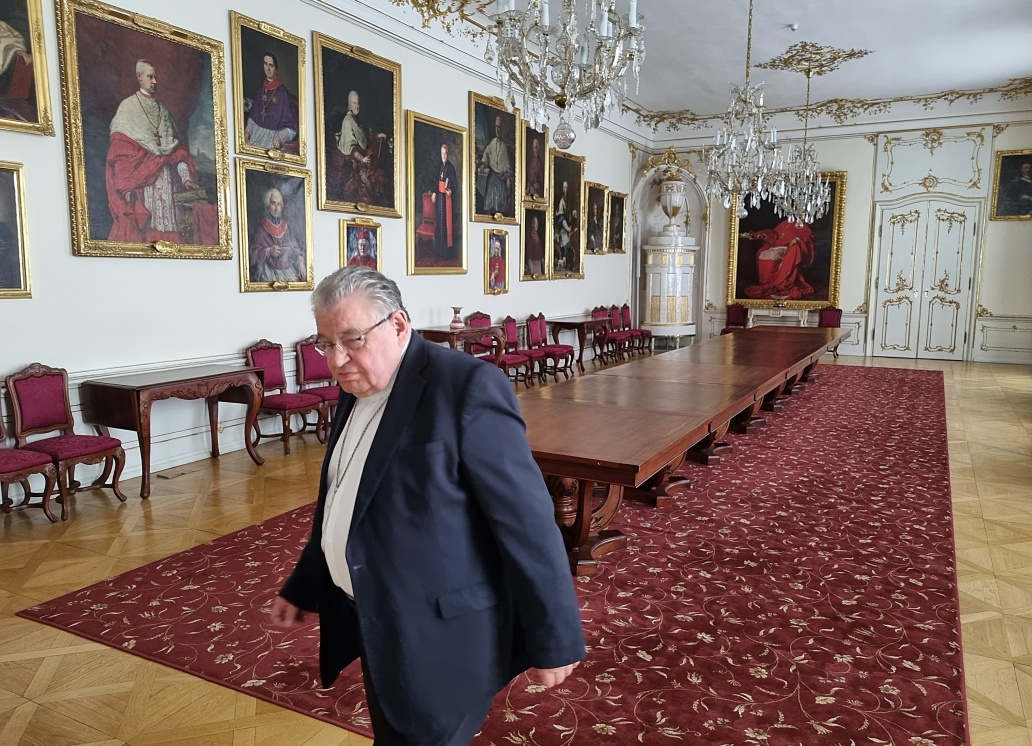
We met Cardinal Dominik Duka, Archbishop Emeritus of Prague, at his residence at the Archbishop’s Palace in Prague. We were particularly interested in hearing his opinion about the Church’s role in presenting a valid alternative to current ideologies, as well as his views on the role that Hungary, and Hungarian churches play in current debates.
Religious freedom in this country reached a certain peak after the fall of communism, and it also manifested itself in legislation. They removed restrictions on religion and opened up church schools. That was a difficult task, because we did not really have the staff. Therefore, the Church was not only faced with the question of how to deepen the life of the Gospel, but also how to create a practical space of freedom so that the Church could exist in its historical tradition stemming from two millennia. This means not only freedom of worship, but also freedom of education, freedom of speech, or the restoration of true Catholic charity.
An element of renewal has entered into the Church, but one which had no experience of that half-century of Christian life under communism.
Of course we cannot blame them for this, because the faithful were also in political opposition, they were in prison, lost their jobs and were even exiled. During the past thirty years after the fall of communism, about a quarter of a million people were baptized. But that is a cohort of people that did not spend their childhood and youth as Catholics, people who live by the community of the Church. This has caused us to be at the level of sixteenth-century Spain, where Sancho Panza says in the novel Don Quixote, “I am not a convert, I am an old Catholic.” At that time, Pedro González, Cardinal de Mendoza (1428-95), the leader of the Spanish Church, realized that there was a need to return to the roots.
This is what we have thought, and I must say that in the first decade we have experienced no tensions of the type that are present in the churches of the developed world. There was a period when the older generation of Czech bishops was leaving, this was happening during the years of the departure of Cardinal Miloslav Vlk, around 2010. These were people who knew each other, and they were from the post-war Episcopal era.
The Bishops’ Conference of this period was sort of a meeting point, but also a crossroads. This time was very sensitive not only to local political stimuli, but also to foreign stimuli. And in a time when evangelization, fidelity to the Gospel, was supposed to be the main issue, a certain part of the developed world was going down the road of, I would say, a “new secularization.” And because the European Church, to which we belong, is a minority in the global Catholic Church, there is an insecurity of the identity of the Church, which is influenced by the total loss of identity both within its political representation and the loss of identity of people as such. It is not just a male-female issue, it goes deeper than that.
This outside influence is still here. That is why there is a break in a certain bond with classical values among believers. Certain new groups have been formed and modern technology is helping this process. When we say they live in a bubble, a similar phenomenon is also happening in the church.
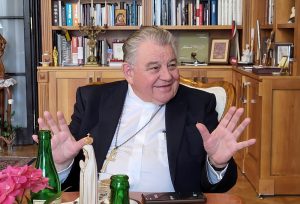
Dominik Duka. Photo: Hungary Today
We have actually succeeded in restoring what is called Catholic Charity, which has great autonomy not only from the state but also from the hierarchy. Catholic Charity is the largest charitable organization in the country. The head of our Catholic Charity is also a member of the Czech Crisis Staff. They have to deal with issues such as migration.
The issue of migration has clearly shown that it is not just a charity issue, but that it is equally a political, security issue, in the highest sense of the word, something that the mainstream does not want to hear.
In the past there were voices here that the Cardinal did not respect Pope Francis, which proved to be false, because when I spoke to the Pope in Krakow, Poland, he clearly said: “You are not letting anyone into the country. You only take care of those whom the state has taken in.” In terms of security guarantees, indeed, some discussion about it came up here, when we said that yes we will accept refugees from Syria, Christians from this region, because we have contacts with the Episcopate, we have a charity that works in these refugee camps in Syria and in Jordan. So we know who we are taking in, but we cannot vouch for others.
The cooperation with embassies has been important here, and specifically with the Hungarian ambassador who came from Cairo in 2015. Egypt acted like Fidel Castro did: it opened the prisons, and said to the political prisoners, go to the United States.
So there was an unequivocal position between us: no, there cannot be unregulated migration here.
The Pope himself said: every country can take as many refugees as it can integrate. However, the fundamental problem, and this is the situation we are in politically and economically, is defined by the policies of the Federal Republic of Germany. The policy of Chancellor Gerhard Schröder and Angela Merkel.
And we know that the whole issue is demographic. In our country, catecheses were closed because village schools were closed. I asked authorities as how they want to solve the demographic problem? At that time they answered, with migration from the countries of the Soviet Union, Asia, and curiously, from Croatia. Then there was a meeting two to three years before (the migrant crisis of) 2015, between the chairmans of the academies of science in Berlin. There it was stated that Europe would be short of 90 million workers. And so it is going to take two decades (to top up the economy) with 40 million new people…
We had a so called Vysehrad 4 meeting, where the cardinals also took part. Here the head of an NGO associated with the UN presented the above figures. However, the former European Commissioner, Mrs. Anna Záborská from the Slovak Republic, reacted by saying: you are crazy! Do you realize that France took in 400,000 refugees, and that meant doubling mandated expenditure, health, social, education… Then do the math. If we were to take in 90 million, it would result in a total collapse.
These are the issues that the church has to deal with, but then some object that this is not preaching the gospel. However, in my opinion,
the dignity of man, and a healthy defense of life, does in fact belong to the gospel.
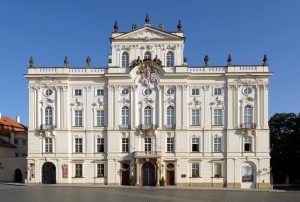
The Archbishop’s Palace in Prague. Photo: Wikipedia
Our meetings in Hungary, Poland, and Slovakia have shown that there is cooperation and awareness in this sense. In the framework of Hungary Helps there is an international meeting every two years, and I have been to these meetings three times in Budapest.
In the effort to make the church on the right wave of evangelization, I would give the best mark to the Hungarian church from these four countries (V4) at the present time.
I have to say that openly. Poland is going through a deep crisis, and after such high personalities that it had given us in the past, whether it was Cardinal Stefan Wyszyński or Pope Wojtyla, to some extent, and this is my personal opinion, the Church in Poland has forgotten that it must have successors to these greats. The present Church in Europe does not have personalities of such stature. We must admit that.
How? In a very special way. I was appointed to the national accreditation committee by the rectors of two universities. I have to say, I was like Alice in Wonderland there. In such institutions after the 1989 revolution, there was a large part of the people who were not progressive but partly Christian, yet there was also a conservative part that had its cultural roots in the First Republic (1918-38). The accrediting commission appointed me to the board of universities.
There was an offer from Mr. George Soros to contribute fifty million dollars if the state would add fifty million Czech crowns, and the Central European University would be established.
I thought it was a generous offer, but I saw the mass opposition to it on that board of colleges. So I had this opposition explained to me, and they basically said that by accepting this offer we would kill our school system completely.
There was a certain suspicion against the pseudo-liberal circles in those early years, and that served as a break (against similar initiatives). But now that this generation has left, we have the return of a leftist orientation that is now in the Czech Republic.
The reality of the Czech-Magyar relations is that the Central European area was really made up of three kingdoms: the lands of the Czech Crown, the Kingdom of Hungary, and the Kingdom of Poland. We know how many times we had one common ruler who united us. Spiritual, cultural, and political-military aspects played a role. The issues within Polish-Hungarian relations were different. Poland and Hungary were neighbors. But then the division of the monarchy made us Czechs very strongly oriented towards Germany.
We know that this historic background was tied with the question of European defense against Islam, and the Turks. A French or a German will never understand this. Then there is the question of the first world war, the changes on the European map, where the international geopolitical issues will differ significantly in Prague, Warsaw, Bratislava, and Budapest.
But what are European values? A Brussels decree or a new EU law is not a value. For me, the most important values are faith and honor. That is, without transcendence, without accountability, I have no value. On the other hand – honor: I can call myself happy when I can look God and my father in the eye and know I am not a traitor. Those are the real values.
There is a concept that has been lost, which is one of the fundamental values of Western civilization, and that is bonum commune (common good). If we are to achieve it, that cooperation has to be there. I cannot see a clash between a democratic government and a church: a free church (can only exist) in a free state. A democratic state. There is of course no cooperation with a dictatorial regime.
On the other hand, today’s mainstream society is the froth at the pond after a big storm, and a very dirty one at that. That froth is the big ideas of Marx, Engels, Lenin, even Freud. They think all this represents liberal democracy. But liberal democracy (built on the ideas of the above thinkers) is nonsense, because one needs freedom to exist, and democracy cannot exist without freedom.
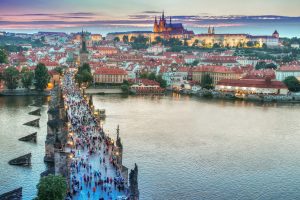
Prague. Photo: Pixabay
From the point of view of our episcopate, such expressions were and are being presented. We are in favor of a cooperative model. But there are times when one side has to speak up. And it can happen that a bishop overreaches himself a little bit and speaks into things that he has no competence to speak about.
On some issues, the Church should have its own voice, namely when it defends fundamental values. But to put out documents that advocate certain hypotheses, such as climate change, I do not think is appropriate.
And that is the current great temptation of the Church. We can solve problems by calling for cooperation. For instance, the problem of hunger in the world will not be solved if we all create poverty here. “Who does not work, let him not eat” – That is what the communists used to say. But we say that if somebody does not want to work, we have to get him to earn his own living, to take care of himself, even with democratic repression. And nobody is obliged to support him.
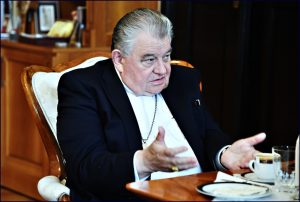
Cardinal Dominik Duka. Photo: Milan Linhart
Take for example the March for Life (pro-life and family initiative). There was a group of fifty-sixty counter-demonstrators, an international group, mostly from Germany, who confronted them. They were shouting at us from their speakers. So if there is a March for Life, we go, us old grandfathers, but the young ones do not take part in the march. I also have a dilemma of whether I should go, because I am attracting those counter-demonstrators who use a vocabulary that children should not hear.
So the left-wing mainstream is one of the biggest threats because they are the grandchildren and great-grandchildren of some of those who sent opponents to their deaths in the 1950s. And before they sent them to their deaths, they also stripped them of their dignity.
I have a verse from my high school years. “Despise those who sell themselves for a better mouthful” – from Hungarian poet Sándor Petőfi. That is what your history is based on.
You must realize that you have saved Europe.
Our Saint Wenceslas (d. 935) is the saint of the Czech basin. But his sword is not included among the coronation jewels, because he was oriented towards Magdeburg, and Regensburg. But we have one more sword in the collections of the Prague castle, and that is the sword of St. Stephen (Hungary’s Stephen I., d. 1038). Both swords are from the tenth century, and are made from Damascus steel.

Photo: Facebook Ancient Hungary
As far as a message is concerned, a quote comes to mind: “…and the gates of hell shall not prevail against it” (Matthew 16.18). And that is the problem with the church, that in some times we are the gate that gets pushed against. But there are times when the church has to attack those gates of hell.
For me, the clear answer here is that Hungary and Poland are the real hope. Even though it is certainly sometimes difficult for Hungary to explain some of its attitudes, because of its unique history.
Featured Image: Hungary Today, Milan Linhart